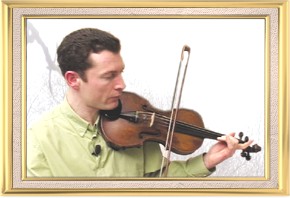Q: Dear
Jörg, I'm very happy to welcome you. Could you please introduce
yourself?
Jörg:
Yes, I'm also happy to be here. I am Jörg Schurig from
Berlin, Germany, and I play the violin with the Berlin Symphony
Orchestra.
Q:
When did you start playing the violin and why?
J:
I started when I was a child, at the age of five, because a
friend of mine had started to play the violin abut two or three
months earlier, and I was so excited about his first recital
that I absolutely had to learn to play the violin.
Q:
Later you studied both the violin and piano?
J:
Yes, at a music college in Dresden.
Q: And
in 1989, you came to Berlin.
J:
Right, I came to Berlin when the wall was torn down. That was
a good moment.
Q:
I would also like to ask you which composer(s) you like most.
J:
This is a good question. The composers I like most, we seldom
play or do not play at all; I play in a concert orchestra, and
we don't play Bach, for example. I like Bach very much, more
than anyone else. Of course, there are always pieces or symphonies
by other composers to which I look forward very much, and I'm
very happy when we play them once every few years.
Q:
And besides Bach, are there other composers that you like?
J:
Oh, yes, Mozart, of course. He had an incredible spirit that
he put into his music, one that you can feel again and again.
His works were never just random compositions, and as far as
I know, he never corrected what he wrote. And that's very interesting,
because many other composers revised their pieces several times.
But his works were apparently created in a whole piece, out
of one inspiration, and he couldn't wait to write them down.
Also, he always had too little time to write down the vastness
that he had in his head or in his being. That's why he could
accomplish so much in such a short time and leave it all to
us.


